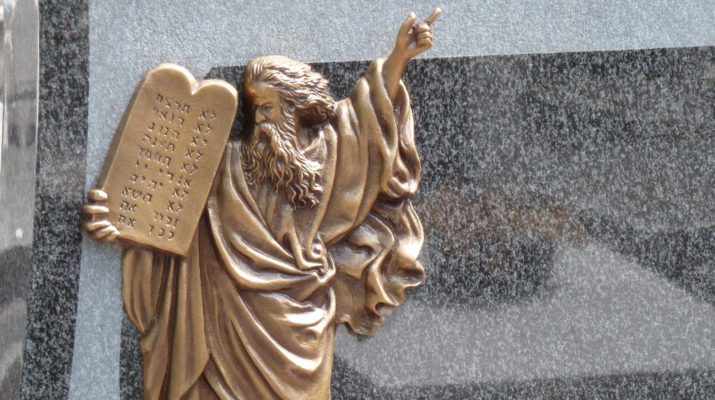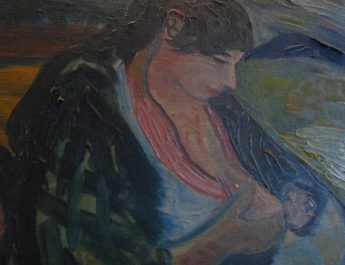Deuteronomy 5:1-10
A Women’s Lectionary – Second Sunday of Easter
1 MosesA convenedB allC Israel,D and said to them:
A “Moses” = Mosheh. From mashah (to pull out in a literal or figurative sense, to draw out) OR from Egyptian mes or mesu (child, son i.e. child of…). This is Moses – the one drawn out from the water, which is to say, rescued. If derived from the Egyptian, his name would share a root with Rameses and Thutmose.
B “convened” = qara. This is to call or call out – to call someone by name. Also used more broadly for calling forth.
C “all” = kol. From kalal (to complete). This is all or every.
D “Israel” = Yisrael. From sarah (to persist, exert oneself, contend, persevere, wrestle, prevail) + el (God or god). This is Israel, meaning God strives or one who strives with God; new name for Jacob and for his offspring. This refers to the people and to the land.
Hear,E O Israel, the statutesF and ordinancesG
E “hear” = shama. This is to hear, call, consent, or consider. It implies listening intelligently, giving attention, and, because of these two factors, obedience and action are often implied.
F “statutes” = choq. From chaqaq (to inscribe, carve, or decree; a lawmaker; literally, this is engraving, but it implies enacting a law because laws were carved into stone or metal). This is statute, boundary, condition, custom, limit, ordinance It is something that is prescribed or something that is owed.
G “ordinances” = mishpat. From shaphat (to judge, defend, pronounce judgment, condemn, govern). This is a verdict or formal sentence whether from humans or from God. It includes the act of judging as well as the place that judging takes place, the suit itself, and the penalty. Abstractly, this is justice, which includes the rights of the participants.
that I am addressingH to youI today;J you shall learnK them and observe them diligently.L
H “addressing” = dabar. This is generally to speak, answer, declare, or command. It might mean to arrange and so to speak in a figurative sense as arranging words.
I “to you” = ozen. Literally, “in your hearing.” This is ear, hearing, audience, show. Properly, it is broadness – applied to its ear in reference to its shape.
J “today” = yom. Root may mean being hot. This is the day in a literal or figurative sense. It can also mean birth, age, daylight, continually or other references to time.
K “learn” = lamad. Properly, this refers to goading (using a pointed stick to guide or prod one’s flock). By implication, it means teaching or instructing.
L “observe…diligently” = shamar + asah. Shamar is to keep, watch, or preserve. It means to guard something or to protect it as a thorny hedge protects something. Asah is to make, do, act, appoint, become in many senses.
M “Lord” = YHVH. From havah (to be, become) or hayah (to come to pass, become, be). This is the name of the God of Israel, the self-existent and eternal one, the tetragrammaton. This pronunciation has been lost to time so “Lord” is generally used in its place.
N “God” = Elohim. Related to “Israel” in v1. See note D above.
O “made” = karat. This is to cut down, cut off, or make a covenant (idiom for making a covenant is “to cut a covenant”). It can also mean to destroy, fail, or consume.
a covenantP with us at Horeb.Q 3 Not with our ancestorsR did the Lord make this covenant, but with us, who are all of us here aliveS today.
P “covenant” = berit. Perhaps from barah (to eat, choose, make clear); perhaps from bar (grain, wheat); from bara (to select, purify, cleanse, test, brighten, polish). This is a compact, covenant, alliance, treaty, or league.
Q “Horeb” = Choreb. 17x in OT. From chareb (to devastate, desolate, or be waste). Horeb means waste or desolate.
R “ancestors” = ab. This is father, chief, or ancestor. It is father in a literal or figurative sense.
S “alive” = chay. From chayah (to live or keep alive literally or figuratively). This is alive, living, lifetime. It can also be used to describe someone’s age. It can refer to animals, plants, water, or a company or congregation of people. It is life in a very broad sense.
4 The Lord spokeT with you faceU to face at the mountain,V out ofW the fire.X
T “spoke” = dabar. Same as “addressing” in v1. See note H above.
U “face” = paneh. From panah (to turn, face, appear). This is face in a literal or figurative sense. It could be face, presence, anger, respect. It can also be used of God to indicate divine favor or presence.
V “mountain” = har. From harar (hill or mountain). This is mountain, hill, hilly region.
W “out of” = tavek. This is among, middle, in the midst, the center. Perhaps, properly, to sever.
X “fire” = esh. This is fire, burning, flaming, hot. It is fire in a literal or figurative sense.
5 (At that timeY I was standingZ betweenAA the Lord andBB you to declareCC to you
Y “time” = et. Probably from anah (to answer, sing, announce); from ad (forever, all, old); from adah (to pass on, advance, decorate oneself). This is a period or season. It can also mean whenever or continually.
Z “standing” = amad. This is to stand up in a literal or figurative sense. So it can be establish, continue, endure, take a stand, act, be a servant, stand still, remain, stand against an enemy.
AA “between” = bayin. From bin (to discern, consider, attend to; distinguishing things in one’s mind or, more generally, to understand). This is among, between, interval.
BB {untranslated} = bayin. Same as “between” in v5. See note Z above.
CC “declare” = nagad. This is to declare, make conspicuous, stand in front, manifest, predict, explain.
the wordsDD of the Lord; for you were afraidEE because ofFF the fire and did not go upGG the mountain.) And he said:
DD “words” = dabar. Related to “addressing” In v1. From dabar (see note H above). This is speech, a word, a matter, an affair, charge, command, message, promise, purpose, report, request. It is a word, which implies things that are spoken of in a wide sense.
EE “were afraid” = yare. This is to fear, be afraid, dreadful. It can also refer to fearful reverence – to fear in a moral sense is to say to revere, respect.
FF “because of” = paneh. Same as “face” in v4. See note U above.
GG “go up” = alah. This is to go up, approach, ascend, be high, be a priority; to arise in a literal or figurative sense.
6 I am the Lord your God, who broughtHH you out of the landII of Egypt,JJ out of the houseKK of slavery;LL
HH “brought” = yatsa. This is to go or come out, bring forth, appear. It is to go out in a literal or figurative sense.
II “land” = erets. Root may mean to be firm. This is earth, ground, field land, or country.
JJ “Egypt” = Mitsrayim. Perhaps from matsor (besieged or fortified place, bulwark, entrenchment; something hemmed in; a siege or distress or fastness); from tsur (to confine, besiege, to cramp). This is Egypt.
KK “house” = bayit. Probably from banah (to build, make, set up, obtain children; to build literally or figuratively). This is house, court, family, palace, temple.
LL “slavery” = ebed. From abad (to work, serve, compel; any kind of work; used causatively, can mean to enslave or keep in bondage). This is a servant, slave, or bondservant.
7 you shall haveMM no otherNN godsOO beforePP me.
MM “have” = hayah. Related to “Lord” in v2. See note M above.
NN “other” = acher. From achar (to be behind, delay, be late, procrastinate, continue). This is following, next, strange, other.
OO “gods” = elohim. Same as “God” in v2. See note N above.
PP “before” = paneh. Same as “face” in v4. See note U above.
8 You shall not makeQQ for yourself an idol,RR whether in the formSS of anythingTT
QQ “make” = asah. Same as “observe…diligently” in v1. See note L above.
RR “idol” = pesel. From pasal (to hew, carve; used for wood or stone). This is an idol or image.
SS “form” = temunah. 10x in OT. From the same as min (kind, sort, species). This is something that has been apportioned or fashioned. It can be an embodiment or shape. It can also figuratively be a favor that manifests.
TT “anything” = kol. Same as “all” in v1. See note C above.
that is in heavenUU above,VV or that is on the earthWW beneath,XX or that is in the waterYY underZZ the earth.
UU “heaven” = shamayim. Root may mean being lofty. This is sky, the air, or heaven. It is in a dual noun form so this might refer to the part of the sky where the clouds move on the one hand and the part beyond that where the sun, moon, and stars are on the other hand.
VV “above” = maal. Related to “go up” in v5. From alah (see note GG above). This is the upper part, forward, high above, upwards, greater, heaven, or exceedingly.
WW “earth” = erets. Same as “land” in v6. See note II above.
XX “beneath” = tachat. This is underneath, below, the bottom, instead of.
YY “water” = mayim. This is water, waters, or waterway in a general sense. Figuratively, it can also mean juice, urine, or semen.
ZZ “under” = tachat. Same as “beneath” in v8. See note XX above.
9 You shall not bow downAAA to them or worshipBBB them; for I the Lord your God am a jealousCCC God,DDD punishingEEE childrenFFF
AAA “bow down” = shachah. This is to bow down, make a humble entreaty, to do homage to royalty or to God.
BBB “worship” = abad. Related to “slavery” in v6. See note LL above.
CCC “jealous” = qanna. 6x in OT– all in the Torah, all referring to God as a jealous God. From the same as qinah (zeal, jealousy, envy, anger, rivalry) OR from qana (to be jealous, zealous, envious). This is jealous.
DDD “God” = El. Related to “Israel” in v1 & “God” In v2. See note D above.
EEE “punishing” = paqad. This is to attend to or visit – can be used for a friendly or violent encounter. So, it can be to oversee, care for, avenge, or charge.
FFF “children” = ben. Related to “house” in v6. From banah (see note KK above). This is son, age, child. It is son in a literal or figurative sense.
for the iniquityGGG of parents,HHH to the thirdIII and fourthJJJ generation of those who rejectKKK me,
GGG “iniquity” = avon. Perhaps related to avah (to bend, twist, be amiss). This is sin, mischief, guilt, fault, punishment for iniquity, or moral evil.
HHH “parents” = ab. Same as “ancestors” in v3. See note R above.
III “third” = shillesh. 5x in OT. From the same as shalosh (three, fork, triad). This is third or relating to the third. Here, it refers to a great-grandchild.
JJJ “fourth” = ribbea. 4x in OT. From the same as arba (four); from raba (to make square or be four-sided). This is fourth or related to the fourth. Here, it would be a great, great grandchild.
KKK “reject” = sane. This is to hate, an enemy. It is a personal hatred and not an abstract one.
10 but showingLLL steadfast loveMMM to the thousandthNNN generation of those who loveOOO me and keepPPP my commandments.QQQ
LLL “showing” = asah. Same as “observe…diligently” in v1. See note L above.
MMM “steadfast love” = chesed. From chasad (being good, kind, merciful; may mean bowing one’s neck as is done in the presence of an equal for courtesy’s sake; so, if one in a superior position is treating you like an equal, that is what is captured here). This is favor, goodness, kindness, loving kindness, pity, reproach, or a good deed. When done by God to humanity, this is mercy/loving kindness. When done by humanity to God, it is piety.
NNN “thousandth” = eleph. Perhaps from the same as eleph (herd, cattle); from alaph (to learn, speak, associate with). This is thousand.
OOO “love” = aheb. This is to love, beloved, friend. It is to have affection for sexually or otherwise.
PPP “keep” = shamar. Same as “observe…diligently” in v1. See note L above.
QQQ “commandments” = mitsvah. From tsavah (to charge, command, order, enjoin). This is a commandment, law, ordinance obligation, or tradition. It is something commanded whether by God or by a human authority. This term is sometimes used collectively to refer to the Law.
Image credit: “Moses” at a Jewish cemetery in Thiais, France. Photo by Djampa, 2011.




